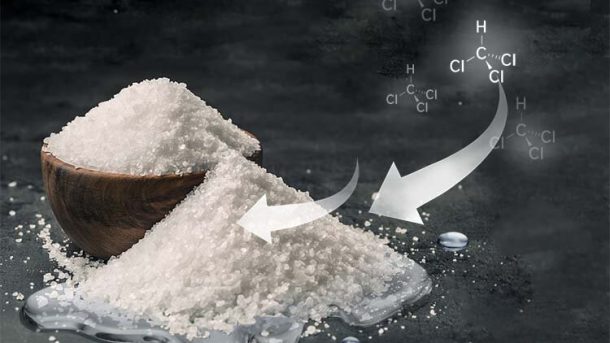Click here to sign in with or
Forget Password?
Learn more
share this!
85
13
Share
Email
June 28, 2022
by University of Tokyo
It has long been known that when salt is kept in a humid environment, it absorbs water, dissolving some of the salt and making it clump. Now, researchers from Japan have discovered that water vapor isn’t the only agent that can do this.
In a study appearing in RSC Advances, researchers from the Institute of Industrial Science, The University of Tokyo, have revealed that organic vapors can trigger the dissolution of molecular salts in a way similar to water vapor.
This finding could have applications for cleaning up indoor pollutants. Volatile organic compounds (VOCs) are organic chemicals that exist as vapors at room temperature. The highest concentrations of VOCs are found indoors, and some are harmful to human health and the environment. These compounds can be removed by a number of methods, but to date, removal by a phenomenon known as organic deliquescence hasn’t been investigated.
“Deliquescence has been used to collect atmospheric water vapor, but to our knowledge, organic vapor-induced deliquescence hasn’t yet been reported,” says lead author of the study, Kazuyuki Ishii. “We investigated this phenomenon using several solid molecular salts that respond to organic vapors by undergoing solid to liquid changes.”
Deliquescence is the process by which a solid becomes a liquid as a result of absorbing enough moisture from the air to become dissolved in an aqueous solution. This has been reported for a number of chemicals, including calcium chloride (CaCl2), that spontaneously create aqueous solutions in humid conditions. Simply increasing the environmental humidity can induce deliquescence (observed as the solid to liquid change) for some water-soluble chemicals, without heating or adding liquid. CaCl2, for example, has been used as a chemical desiccant (i.e., a water-absorbent substance used to induce or maintain dryness).
“We used CaCl2 powder in a typical control experiment, in which it clearly changed to an aqueous solution via water vapor-induced deliquescence,” explains Kyoko Enomoto, senior author. “The changes we observed in molecular salts in the presence of an organic vapor were similar to the results of that control experiment under equivalent conditions.”
The researchers observed that the molecular salts changed from solid to liquid when chemicals such as chloroform (CHCl3) were used as organic solvents.
“We found that organic deliquescence isn’t rare—instead, suitable organic deliquescent responses to VOCs can be designed based on the general rule ‘like dissolves like,'” explains Ishii.
There is a pressing need to remove VOCs from indoor environments using organic solvents, particularly industrial facilities that use large amounts. On the basis of the efficacy of CaCl2 as a chemical desiccant for collecting atmospheric water vapor, the results of this study offer a promising method for developing agents to capture VOCs.
Explore further
Mars rover scientist hopes to find more evidence of liquid water
Explore further
Facebook
Twitter
Email
Feedback to editors
17 hours ago
3
17 hours ago
0
17 hours ago
0
18 hours ago
0
Jun 27, 2022
0
6 hours ago
9 hours ago
10 hours ago
10 hours ago
11 hours ago
12 hours ago
13 hours ago
1 hour ago
2 hours ago
2 hours ago
2 hours ago
2 hours ago
3 hours ago
More from Physics Forums | Science Articles, Homework Help, Discussion
May 17, 2016
Feb 01, 2022
Jun 13, 2022
May 30, 2022
Mar 25, 2019
Dec 03, 2021
10 hours ago
16 hours ago
16 hours ago
Jun 27, 2022
Jun 24, 2022
Jun 24, 2022
Use this form if you have come across a typo, inaccuracy or would like to send an edit request for the content on this page. For general inquiries, please use our contact form. For general feedback, use the public comments section below (please adhere to guidelines).
Please select the most appropriate category to facilitate processing of your request
Thank you for taking time to provide your feedback to the editors.
Your feedback is important to us. However, we do not guarantee individual replies due to the high volume of messages.
Your email address is used only to let the recipient know who sent the email. Neither your address nor the recipient’s address will be used for any other purpose. The information you enter will appear in your e-mail message and is not retained by Phys.org in any form.
Get weekly and/or daily updates delivered to your inbox. You can unsubscribe at any time and we’ll never share your details to third parties.
More information Privacy policy
Medical research advances and health news
The latest engineering, electronics and technology advances
The most comprehensive sci-tech news coverage on the web
This site uses cookies to assist with navigation, analyse your use of our services, collect data for ads personalisation and provide content from third parties. By using our site, you acknowledge that you have read and understand our Privacy Policy and Terms of Use.




